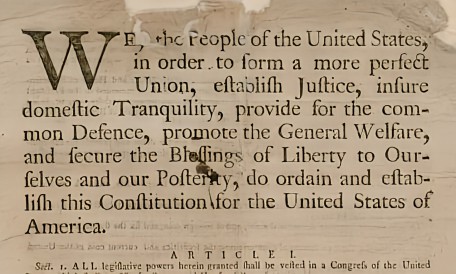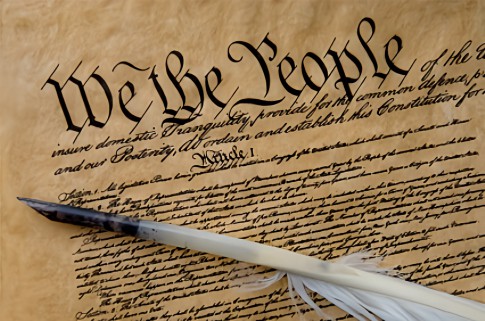A Look Back…and A Way Forward – Our Constitution: Ignore or Restore
This Sunday, September 17, we will commemorate the anniversary of the signing of the U.S. Constitution. I would like to take this occasion to share some general thoughts on constitutions as well as some thoughts on ours – including its basis, origin, and restoration.
As we can learn from history, good constitutions are fundamentally organic and develop out of a moral order, and every moral order is born of religious beliefs. At the dawn of any civilization, people unite in search of communion with a higher power, and from that religious community, all other aspects of culture flow – including a civilization’s laws. True law is rooted in ethical assumptions or norms, and those ethical principles are initially derived from religious perceptions or convictions. In order for the heart of American laws to endure, the source that moved them in the beginning must continue, and that source was primarily natural law rooted in Judeo-Christian metaphysics. American laws and social institutions rest upon the moral postulates of Christianity and are intricately woven into the fabric of our culture. This in fact is the moral foundation of our constitution.
The restoration of order accomplished through the American constitution grew out of 180 years of colonial self-government and more than seven centuries of British experience – along with older sources of history and experience such as that of the Roman Republic and the Greek city-states. Ours is the oldest and longest functioning constitution in modern history and it has maintained a balance between the claims of freedom and the claims of authority as has no other. Our constitution was born out of a culture, not created by a country. It grew; it was not invented.
In reality, America possesses two constitutions, existing side by side yet distinct. One is the formal written constitution, and the other is the older unwritten one – of customs, compromises, conventions, habits, and ways of living together in the civil social order that developed in America since Jamestown. This order is bigger than its laws, and many aspects of it are determined by beliefs and customs rather than being created by good laws. Enduring constitutions contain provisions and assumptions which are permanent, preserving a society’s continuity through many generations. No matter how admirable a constitution may look on paper, it will be ineffectual unless the unwritten constitution reflects and affirms a moral order of obligation and personal responsibility. As John Adams expressed, “Our Constitution was made only for a moral and religious people. It is wholly inadequate to the government of any other.” James Madison stated, “To suppose that any form of government will secure liberty or happiness without any virtue in the people is a chimerical [impossible/illusionary] idea.”
What it comes down to is our willingness to govern ourselves in accordance with those timeless and proven “moral and religious” principles and precepts that have sustained us for so long and doing so through what Edmund Burke described as the “little platoons.” These are the local/community institutions such as our families, neighborhoods, churches, civic organizations, schools, and voluntary associations which serve the common good, undergird American character, strength, and freedom, and represent the “unwritten” substance of our Constitution and the building blocks of our culture. In Alexander Hamilton’s words, “The safety of a republic depends essentially on the energy of a common national sentiment; on a uniformity of principles and habits; on the exemption of the citizens from foreign bias, and prejudice; and on that love of country which will almost invariably be found to be closely connected with birth, education, and family.” As James Madison expressed it: “We have staked the whole future of our new nation, not upon the power of government; far from it. We have staked the future of all our political constitutions upon the capacity of each of ourselves to govern ourselves according to the moral principles of the Ten Commandments of God.”

What happens when that culture abandons its roots, its foundation, its religious heritage founded upon the transcendent? What happens to a tree when its roots cease to function in providing sustenance and stability? Does America’s constitution, while still retaining its original form, still live and retain its original identity, purpose, and effectiveness? Over time, a people can lose their Constitution even without changing its written provisions. This is in great part the consequence of treating our Constitution as a living document rather than one rooted in history, experience, and wisdom to be interpreted according to its original text and intent. In the former, we’ve seen laws and rights created out of thin air and our constitution subjected to any manner of judicial interpretation necessary to make it conform to the demands of the controlling political class, regardless of the prevailing cultural norms and moral sensibilities of the people. This was perhaps most telling and consequential in the 1973 Roe v. Wade SCOTUS decision. Most recently, it was seen in the circumvention of the constitution in the 2020 elections when some state legislatures were unlawfully stripped of their authority over state election procedures. When our constitutional order becomes too cumbersome, then those in high office choose to call an audible play around “We the People”and rule by executive order or judicial fiat.
This begs the questions: Are we a nation of laws or of men? Is law rooted in truth? Does law originate from an eternal and enduring moral authority? Is law based on unchanging principles of truth and justice? Is law transcendent, immutable, and morally binding? Or… is law a subjective and vacillating human construct to be fabricated and used for political expediency and social engineering to serve the self-interest of those in power at the expense of those whom they are elected to serve?
The bedrock upon which the American political system is built is the rule of law. The contrast between tyranny and the rule of law is a central theme of political thinkers back to classical antiquity. The idea that the law is superior to rulers is the cornerstone of English constitutional thought as it developed over the centuries, beginning with the Magna Carta in 1215. The concept was transferred to the American colonies and was expressed in colonial pamphlets and political writings. As Thomas Paine wrote in Common Sense: “For as in absolute governments the King is law, so in free countries, the law ought to be king; and there ought to be no other. But lest any ill use should afterward arise, let the crown at the conclusion of the ceremony be demolished and scattered among the people whose right it is.”
America was founded and built from the ground up, by individuals, families, and communities, and it is still here at the local grassroots level where the restoration of our constitution must begin if it is to be substantive and enduring. Our constitution doesn’t need to be rewritten or replaced – it just needs to be understood and lived out. As one author put it: “Great states with good constitutions develop when most people think of their duties and restrain their appetites. Great states sink toward their dissolution when most people think of their privileges and indulge their appetites freely.” In other words, the dissolving of religious convictions (which serve as moral restraints) will bring about the decadence of our civil social order and ultimately the undoing of our constitution from the inside out. That is if we stay on the present course.
As John Adams stated, “The only foundation of a free Constitution is pure virtue, and if this cannot be inspired into our People in a greater Measure than they have it now, they may change their rulers and the forms of government, but they will not obtain a lasting liberty.” The demise or restoration of America’s constitution will be determined more by choices than by circumstances.” G.K Chesterton reminds us that history does not unfold like clockwork but instead is the unpredictable unfolding of a moral tale that depends, in every moment, on what people choose to do or not do. What will you and I choose?
Reflections from History and Faith, by Jeff Olson
Click here to read “From Sea to Shining Sea” by Jeff Olson.

Jeff Olson, Author
Cover Image: Navyatha123, CC BY-SA 4.0 <https://creativecommons.org/licenses/by-sa/4.0>, via Wikimedia Commons



Good reminder to me and others to not take our Constitution for granted. Shine the light on those in this country and the world would deconstruct it. Without the constitution we are in chaos and tyranny.